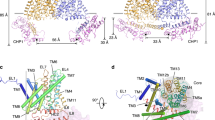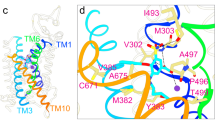Abstract
IT is now widely accepted that the extrusion of sodium from living cells is associated with the splitting of ATP at the inside surface of the cell membrane1–7. The mechanism responsible is inhibited by cardiac glycosides and it is affected in a complicated way by potassium ions. With membrane preparations from most cells, glycoside-sensitive ATPase activity can be demonstrated only when both sodium and potassium are present5, and in red cells and nerve there is evidence that the sodium ions must be inside and the potassium ions outside6,7. This fits in with the known coupling between sodium efflux and potassium influx in these tissues, and suggests that under normal conditions the transport mechanism catalyses an exchange of sodium ions for potassium ions across the membrane using energy from the hydrolysis of ATP at the internal surface.
This is a preview of subscription content, access via your institution
Access options
Subscribe to this journal
Receive 51 print issues and online access
$199.00 per year
only $3.90 per issue
Buy this article
- Purchase on Springer Link
- Instant access to full article PDF
Prices may be subject to local taxes which are calculated during checkout
Similar content being viewed by others
References
Skou, J. C., Biochim. Biophys. Acta, 23, 394 (1957); 42, 6 (1960); 58, 314 (1962).
Dunham, E. T., and Glynn, I. M., J. Physiol., 156, 274 (1961).
Post, R. L., Merritt, C. R., Kinsolving, C. R., and Albright, C. D., J. Biol. Chem., 235, 1796 (1960).
Hoffman, J. F., Fed. Proc., 19, 127 (1960).
Bonting, S. J., Simon, K. A., and Hawkins, N. M., Arch. Biochem., 95, 416 (1961).
Glynn, I. M., J. Physiol., 160, 18P (1962).
Whittam, R., Biochem. J., 84, 10 (1962).
Glynn, I. M., J. Physiol., 136, 148 (1957).
Shaw, T. I., Cambridge Univ. Ph.D. dissertation (1954).
Glynn, I. M., J. Physiol., 134, 278 (1956).
Frumento, A. S., and Mullins, L. J., Nature, 204, 1312 (1964).
Keynes, R. D., and Swan, R. C., J. Physiol., 147, 591 (1959).
Keynes, R. D., J. Physiol., 178, 305 (1965).
Mullins, L. J., and Frumento, A. S., J. Gen. Physiol., 46, 629 (1963).
Hoffman, J. F., Tosteson, D. C., and Whittam, R., Nature, 185, 186 (1960).
Hoffman, J. F., J. Gen. Physiol., 45, 837 (1962).
Baker, P. F., Biochim. Biophys. Acta, 88, 458 (1964).
Caldwell, P. C., Hodgkin, A. L., Keynes, R. D., and Shaw, T. I., J. Physiol., 152, 561 (1960).
Sen, A. K., and Post, R. L., J. Biol. Chem., 239, 345 (1964).
Whittam, R., and Ager, M. E., Biochem. J. (in the press).
Author information
Authors and Affiliations
Rights and permissions
About this article
Cite this article
GARRAHAN, P., GLYNN, I. Uncoupling the Sodium Pump. Nature 207, 1098–1099 (1965). https://doi.org/10.1038/2071098a0
Published:
Issue Date:
DOI: https://doi.org/10.1038/2071098a0
This article is cited by
-
Sodium transport in Na+-rich Chlorella cells
Planta (1973)
-
Ein Beitrag zum molekularen Modell einer Ionenpumpe
Pfl�gers Archiv f�r die Gesamte Physiologie des Menschen und der Tiere (1967)
-
Driving the Sodium Pump backwards to form Adenosine Triphosphate
Nature (1966)
Comments
By submitting a comment you agree to abide by our Terms and Community Guidelines. If you find something abusive or that does not comply with our terms or guidelines please flag it as inappropriate.



